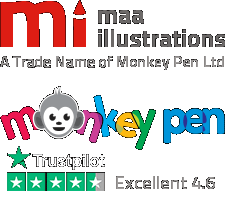Technical illustrator can be a rewarding career path for those with a passion for art and an aptitude for visual communication. Technical illustrators play an important role in visually communicating complicated concepts, designs, and instructions in a variety of industries. Developing good artistic talents is the foundation for becoming a technical illustrator. Begin by practising your drawing, sketching, and painting skills and developing your creativity. Consider taking art classes or visiting workshops to learn different methods, composition, and colour theory. Regular practise will sharpen your talents and create the framework for your career as an illustrator.
A technical illustrator must have technical understanding in addition to artistic ability. Learn about the field in which you want to specialise, such as engineering, architecture, or science. Understanding technical concepts and information will allow you to create accurate and informative illustrations that will appeal to your audience. Familiarise yourself with illustration software such as Adobe Illustrator, CorelDRAW, or Autodesk AutoCAD. Digital tools allow you to generate editable, scalable illustrations that match industry standards.Formal schooling can lay the groundwork for a successful career as a technical illustrator. Consider getting a degree or certificate in illustration, graphic design, or another related field. Formal education not only sharpens your talents, but it also exposes you to industry specialists, providing you with significant networking possibilities.
Create a comprehensive portfolio that includes both traditional and digital illustrations, displaying your ability in many styles and subjects. Make your portfolio relevant to the industry you want to work in. Consider specialising in a particular area of technical illustration. Whether it's engineering, medical, architectural, or scientific illustration, focusing on a certain subject will help you become an expert in that industry, enhancing your marketability and prospects for specialised assignments. Gain practical expertise in your chosen field through internships, freelance work, or entry-level roles. Real-world projects allow you to put your talents to use, create a professional network, and learn about industry trends and client preferences. To learn from professionals and broaden your creative horizons, attend workshops, webinars, and industry events.
Maintain your skills and expertise by staying current on the newest trends, techniques, and software in technical illustration. Remember that being a technical illustrator takes time and perseverance. Stay persistent, patient, and passionate about your craft, and you may construct a successful path as a technical illustrator with persistence and continual growth.






